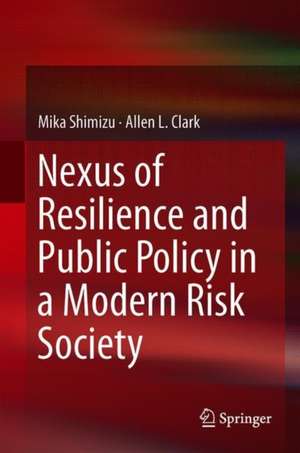Nexus of Resilience and Public Policy in a Modern Risk Society
Autor Mika Shimizu, Allen L. Clarken Limba Engleză Hardback – 14 feb 2019
This is the first book to articulate resilience-based public policy for a constantly changing, complex, and uncertain risk society. Its primary focus is on operationalizing resilience, i.e., on incorporating elements of resilience in public policy in the context of our modern risk society.While there is a wealth of literature on resilience and disaster risk management, there are few publications that focus on the nexus of resilience and public policy, resulting in gaps between various fields and public policy for resilient societies and disaster risk management.
In response, this book integrates the latest theoretical insights on public policy and resilience and the latest practical analyses of case studies such as the Tohoku Disaster (Great East Japan Earthquake) in 2011 and Hurricane Sandy on the North American East Coast in 2012 to provide policy tools for future resilient societies and disaster risk management. The recent disaster cases illustrate that our changing, complex and uncertain risk environment requires far more resilience-based public policy through co-production of knowledge than is normally required for conventional disasters. By linking various fields and public policy, the book articulates a resilience-based public policy, i.e., the incorporation of resilience into various entities by designing and implementing “linkages.” These include national-to-local linkages, linkages between different entities such as scientific communities and decision makers, and linkages between financial, human, and information resources. Thus, the nexus of resilience and public policy presented in this book aims at better public policy to face a changing and complex risk society, together with fundamental uncertainties at regional, national, and local levels around the world.
Preț: 583.45 lei
Preț vechi: 686.42 lei
-15% Nou
Puncte Express: 875
Preț estimativ în valută:
111.65€ • 115.36$ • 92.88£
111.65€ • 115.36$ • 92.88£
Carte tipărită la comandă
Livrare economică 19 martie-02 aprilie
Preluare comenzi: 021 569.72.76
Specificații
ISBN-13: 9789811073618
ISBN-10: 9811073619
Pagini: 200
Ilustrații: XIII, 145 p. 32 illus., 13 illus. in color.
Dimensiuni: 155 x 235 mm
Greutate: 0.4 kg
Ediția:1st ed. 2019
Editura: Springer Nature Singapore
Colecția Springer
Locul publicării:Singapore, Singapore
ISBN-10: 9811073619
Pagini: 200
Ilustrații: XIII, 145 p. 32 illus., 13 illus. in color.
Dimensiuni: 155 x 235 mm
Greutate: 0.4 kg
Ediția:1st ed. 2019
Editura: Springer Nature Singapore
Colecția Springer
Locul publicării:Singapore, Singapore
Cuprins
1. Introduction.- 2. Nexus of Resilience and Public Policy: Systems Views.- 3. Modern Risk Society: Social Needs for Resilience through Co-Knowledge Production.- 4. Nexus of Resilience and Public Policy: Case of Tohoku Disaster.- 5. Nexus of Resilience and Public Policy: Case of Sandy Hurricane.- 6. Nexus of Resilience and Public Policy: Assessment of Regional Practices in Asia.- 7. Global Co-knowledge Production Based Resilience Practices.- 8. Resilience Assessment Framework.- 9. Policy Implication and Conclusion: Facing Deep Uncertainties.
Notă biografică
Mika Shimizu, Kyoto University
Allen L. Clark, East-West Center
Textul de pe ultima copertă
This is the first book to articulate resilience-based public policy for a constantly changing, complex, and uncertain risk society. Its primary focus is on operationalizing resilience, i.e., on incorporating elements of resilience in public policy in the context of our modern risk society.While there is a wealth of literature on resilience and disaster risk management, there are few publications that focus on the nexus of resilience and public policy, resulting in gaps between various fields and public policy for resilient societies and disaster risk management.
In response, this book integrates the latest theoretical insights on public policy and resilience and the latest practical analyses of case studies such as the Tohoku Disaster (Great East Japan Earthquake) in 2011 and Hurricane Sandy on the North American East Coast in 2012 to provide policy tools for future resilient societies and disaster risk management. The recent disaster cases illustrate that our changing, complex and uncertain risk environment requires far more resilience-based public policy through co-production of knowledge than is normally required for conventional disasters. By linking various fields and public policy, the book articulates a resilience-based public policy, i.e., the incorporation of resilience into various entities by designing and implementing “linkages.” These include national-to-local linkages, linkages between different entities such as scientific communities and decision makers, and linkages between financial, human, and information resources. Thus, the nexus of resilience and public policy presented in this book aims at better public policy to face a changing and complex risk society, together with fundamental uncertainties at regional, national, and local levels around the world.
Caracteristici
Presents a new nexus of resilience and public policy Points out how to incorporate resilience into projects or programs to build resilient societies Describes how to foster co-production of knowledge in complex and uncertain risk societies
